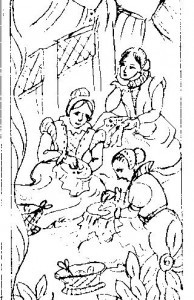Lea Wait's Blog, page 263
April 14, 2016
Authorfest 2016
John Clark sharing an amazing day at Cape Elizabeth High School which started Friday evening April 8th with an evening event I was unable to attend, but here’s what kicked off the weekend.
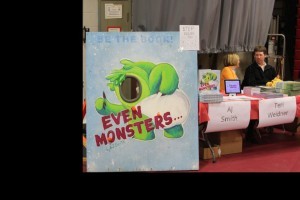
What greeted you as you entered Authorfest.
Jane Yolen is the award winning author over 300 books, including Owl Moon, The Devil’s Arithmetic, and the How Do Dinosaurs series. Her daughter, Heidi Stemple, also an accomplished writer will join her for a discussion of their work, perhaps a reading or two and a Q&A with the audience. Beth and I had the great pleasure of seeing Jane and fellow author Bruce Coville feed off each other at BOSCONE ten years ago. On Saturday I chatted briefly with her and thanked her for that memory. She told me that every time they get together, it’s as if each other’s energy stimulates verbal creativity and the result is a great experience for the audience.

Just a few of the authors at the fest.
The big event started on Saturday morning with a special hour for librarians to meet and greet the authors who came. It was a very impressive lineup as you can see below. Here’s who came.
Adam Shaughnessy, Adi Rule, AJ Smith, Amanda Marrone, Ammi-Joan Paquette, Andres Vera Martinez, Anica Mrose Rossi, Annabeth Bondor-Stone and Connor White, Anni Cardi, Ariele Sieling, Brian Lies, Chris Van Dusen, Dana Alison Levy, David A. Kelly, David Biedrycki, David Elliott, David Potter, Diana Renn, Elizabeth Atkinson, Emilie Christie Burack, Eric Pinder, Erin Dionne, Erin Moulton, Fran Hodgkins, Francisco Stork, Gail Donovan, Gary Urey, Grace Roberts, Hazel Mitchell, Heather Hepler, Heidi Stemple, Jamie Hogan, Jane Yolen, Jay Piscopo, Jeannie Brett, Jen Malone, Jon &Pam Voeckel, Josh Funk, Julie Falatko, Kathyrn Williams, Katie Quirk, Kendall Kulper, Kevin Hawkes, Kristine Carlson Asselin, Kristine Lombardi , Lee Gjertsen Malone, Lisa A. Kramer, Lisa Jahn-Clough, Ed Briant, Liza Gardner Walsh, Liza Kleinman, Lori Goldstein, Luke Reynolds, Mackenzie Lee, Marcia Wells, Marcy Kate Connolly, Maria Padian, Mark Scott Ricketts, Marty Kelly, Mary Atkinson, Megan Frazer Blakemore, Monica Tesler, Padma Venkatraman, Paul Czajak, Paul Durham, Phil Bildner, Ralph Fletcher, Ronni Arno, Ryan T. Higgins, Sarah Albee, Sarah Dillard, Sarah S. Brannen, Sashi Kaufman, Scott Magoon, Scott Nash, Stefanie Jolicoeur, Suzanne Nelson, Suzy Becker, Tamara Ellis Smith, Tamra Wight, Teri Weidner, Terry Farish, Trisha Lever.
I gave in to my OCD and looked up all of them on Amazon to create a list of books I wanted to get and have signed. While the majority of them were easy reader/picture book authors, juvenile and young adult authors were there, too. I was able to tell Francisco Stork how much Beth and I liked listening to his new book The Memory of Light which School Library Journal sent me for review. It’s an excellent story about a girl whose sense of grief and loss following her mother’s death from cancer drives her to make a suicide attempt and what happens after she meets three other teens who had failed when attempting to kill themselves.
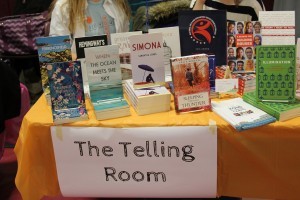
Books by The Telling Room authors.
In addition to individual authors, The Telling Room, a nonprofit writing center in Portland, Maine, dedicated to the idea that children and young adults are natural storytellers, (http://www.tellingroom.org/) had a table with books published by members. There was only a display copy of the one I wanted, Sleeping Through Thunder by Grace Roberts, so I’ll order it from their website. The enthusiasm of the young authors at that table, as well as the appearance of their displayed books was quite impressive.
While I was looking for the authors with books I wanted, several young ladies stopped and asked if I would like a copy of their book. (I suspect my camera might have been what made them stop.) Never one to turn down a book, I accepted a copy and asked them about it. The accompanying photo which I cleared before taking, shows you their display and how poised and enthusiastic they are. This is a middle school creative writing project, the sort that should be in every school, but sadly isn’t. In return for the gift, I promised I would create a bibliographic record for it that would be part of MaineCat, the statewide online library catalog.
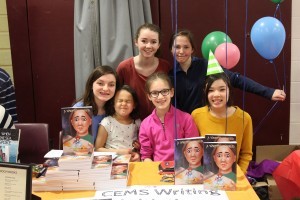
I wish every school in Maine could support young writers like this.
What books did I get? First off is Ruby Reinvented by Camden author Ronni Arno. It’s a middle grade story about a girl whose parents are a star pitcher for the Dodgers and a fashion model. When she discovers her private school friends only hang with her because she has famous parents, she reacts by asking them to let her attend a a boarding school in midcoast Maine. She gets caught up in an impulsive lie that is at the heart of the story. I read it quickly and can say it’s intelligent and well written, a book that will appeal to smart tween readers.
Granddaughter Piper is the proud owner of a signed copy of Manny’s Cows by Suzy Becker and Beth is currently reading The Looney experiment by Luke Reynolds. I have three more to savor in the near future: Drift & Dagger by Kendall Kulper, a combination fantasy thriller, The Hidden Twin by Adi Rule another fantasy that fans of Tamora Pierce will love, and Keepers of the Labyrinth by Erin E. Moulton an urban fantasy about a daredevil girl trying to cope with and understand her mother’s death. It involves Crete and a Minotaur.
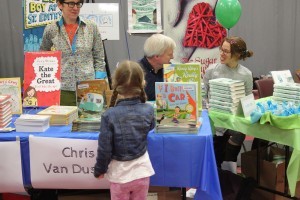
Multiply this girl’s excitement by a couple hundred and you get a sense for how much energy was in the room.
This was not the first Authorfest, but it was the first I was aware of and I certainly hope it won’t be the last. It was supported/sponsored by Bullmoose who handled book sales seamlessly, as well as Ocean House Gallery, The Inn By The Sea and The Farm stand, a local produce and butcher shop.
Behind the Library Curtain
John Clark helping celebrate National Library week with some behind the scenes stuff from the Maine Library listserv Melibs-l which has over 1200 members from all over the country. It’s where we discuss vexing issues, tap the collective wisdom to help patrons looking for books the want to reread, but can’t quite remember, give away stuff and share really cool programs and innovations. I added a few pictures of Maine libraries that came from the directory Ellen Wood set up on the state library page You can see all of them here: http://www.maine.gov/msl/libs/directories/public.shtml
Balancing revenue needs with service: I’m wondering what requirements you all have for registering new patrons that are summer employees, or summer visitors (not property owners; people potentially with no leases). If you’d be so kind as to share; I’d be grateful.
When we’re asked to be surrogate parents: If you have an Unattended Children policy could you please share it with me? We are looking at updating our policy. Specifically, I’m interested in knowing if your library staff are REQUIRED to stay after closing if parents don’t show up? Paid or unpaid? For how long? What liabilities or other legalities should we be aware of in terms of unattended children? Our current policy involves attempting to call parents and/or police if the parents cannot be reached but that still involves unpaid staff time to wait for those folks after closing time.
The list is great when we need fast help for eager patrons: A query about sports books for grade 6-8 sporty girls netted these titles: Stealing Parker, Catching Jordan, Breathe, Annie, Breathe, Pretty Tough Novel series, Lorimer Sports Stories, Soccerland by Beth Choat, Bat 6 by Virginia Euwer Wolff, The Kicks by Alex Morgan
Another example: I am looking for fiction and non-fiction titles for young adults on addictions. Specifically, I need books that deal with addictions to gambling, hoarding, playing video games, and food.
There are a lot of cool technical opportunities in Maine and libraries are a great place to find them: The Maine Mathematics and Science Alliance is once again hosting Maine Scratch day Saturday, May 14. They would love to involve more libraries this year and encourage everyone to join. “Scratch Day is very easy to do and is great for libraries, schools, afterschool programs, and other groups. It’s Saturday, May 14, this year, and there are great resources that make it easy to host an event. Events can be a few kids or a large group, a couple hours or a half-day. It’s a great way to continue what you started with Hour of Code, too. We really want to help get more sites in Maine involved this year, and list the participating sites on our website and at http://day.scratch.mit.edu. Interested?
We excel at determining the answer to very fuzzy questions: A puzzle for you slueths out there. Patron doesn’t know the author or the title. Not even the color of the bookcover! A series (at least three, maybe five books) about a family who moved from the Scottish highlands to Virginaia. Takes place from the 19th century to early 20th century. Is told from the viewpoint of the women who married into the family. This was solved as follows: I would say it’s not a move to Virginia but Texas. Perhaps it’s “My Name Is Falon: One Woman’s Saga from Scotland to the Texas Frontier” by Kim Wiese
A patron has asked for help in finding this book. Here is her description I read it probably 20 years ago and I think it was old at the time. It is either a Maine Indian tale or perhaps a folklore tale from Quebec. It takes place in a forested region where the men work logging. The subject is a lady who would prefer to be an animal, a quail if I remember right. She only retains these properties if she lives in that region. She becomes a quail during the day and a woman at night. On the ever popular topic of delivery bags comes this St. Patrick’s Day (I answered this because I’d read the book. Maine author. Can you name it??)
The Statewide van service is an amazing resource, but there never seem to be enough bags to go around, so librarians get creative with their pleas:
The Eternal quest for delivery bags used for interlibrary loan
Limerick There once was a library in Maine
To pack all their items, a pain
‘Cause bags, they were low.
Have M and L ones? No.
But surely some would come before they completely ran out because the other Maine libraries will take pity on us…
We are strong supporters of local authors: Tamra Wight, the author of Cooper and Packrat: Mystery on Pine Lake (an MSBA nominee) and Cooper and Packrat: Mystery of the Eagle’s Nest is launching a fun book trailer contest in honor of the April 26th release of her third book in the series, Cooper and Packrat: Mystery of the Missing Fox! This could be an awesome project for classes and/or individual students and a chance to win great prizes!
Check out Tami’s website for more information on this book trailer project: http://www.tamrawight.com/contests/
Another example of very cool stuff happening behind the scenes: Here are the results we gathered for Maker/Hacker spaces in Maine. We’re happy to add if you know of any that are not currently listed. FYI we didn’t include meet-up groups. It wasn’t specifically the type of resource we were trying to quantify, and was challenging to assess without more research. https://www.google.com/maps/d/edit?mi... Thanks to all who contributed.
Modern flashers in the library: Since the dawn of man (and floppy disks), we have had a policy of no outside storage devices allowed in our patron computers due to the danger of bad doobies introducing viruses and/or other nasties into our pristine network. I am now wondering if this is still a necessity. Many folks have mentioned that this is a real problem for them as they need to save a copy of their edited resume, or meeting agenda, or secret spy documents (to a flash drive) and therefore cannot use our computers and, occasionally in a huff, take their business elsewhere…darn you Dyer and McArthur. My questions are these 1) how many of you have a policy similar to ours and 2) for those of you who do not, and allow flash drives, etc, have you ever had a problem due to that?
Thank you in advance for the wonderful wave of knowledge I know is headed my way!
Libraries look out for more than kid’s brains: Libraries Can Help Prevent Child Hunger This Summer!
Hungry children cannot learn. Lack of proper nutrition during the summer months exacerbates the phenomenon known as summer learning loss. The Summer Food Service Program, also known as Summer Meals, is designed to fill the gap between school years and give children the fuel they need to play and grow throughout the summer and return to school ready to learn. Libraries are trusted and safe community hubs and a natural place for children to congregate. In Maine, there is limited participation in Summer Meals because there are not enough sites and many families are unaware of the program. Your library can help by becoming a meal site and promoting the program.
Your library can help by becoming a Summer Meals site!
The Summer Meals program provides free, nutritious meals and snacks to children in low-income areas. It is federally-funded by the USDA, state-administered by the Maine Department of Education Child Nutrition, and locally-operated by sponsors. Sponsors are often school districts, local government agencies, or private, non-profit organizations. Sponsors prepare the meal and are financially responsible for the program. Sites are the physical locations where the food is served and consumed. Each site works with a sponsor and sites are managed by site supervisors.
New Library Sites in Summer 2015 Share Their Stories: From rural to urban, there is a consensus among new library sites in 2015 that Summer Meals was a successful program they were happy to offer their patrons. They all would like to participate again in Summer 2016 and strongly recommend it to other libraries. They found the paperwork and responsibilities to be very manageable and the children will well-behaved. Many pair the meal with their summer reading program and the Children’s Librarian assumes the role of site supervisor.
April 12, 2016
Wherever You Hang Your Hat
Katherine Hall Page: We’re closing in on Patriot’s Day, celebrated only in Maine and  Massachusetts. Wisconsin has one that is a school holiday, but we know that’s not the real deal. The holiday is relatively recent. Maine replaced something called “Fast Day” where you, well, fasted—and prayed—with Patriot’s Day in 1907. Patriots’ Day—note the subtle position of the apostrophe—was first proclaimed in Massachusetts in1894.The punctuation is significant. In Maine we’re individualistic in our patriotism just as we are in everything else.
Massachusetts. Wisconsin has one that is a school holiday, but we know that’s not the real deal. The holiday is relatively recent. Maine replaced something called “Fast Day” where you, well, fasted—and prayed—with Patriot’s Day in 1907. Patriots’ Day—note the subtle position of the apostrophe—was first proclaimed in Massachusetts in1894.The punctuation is significant. In Maine we’re individualistic in our patriotism just as we are in everything else.
Patriot’s Day is the 18th of April this year. Since 1969, both states opted for a nice three-day weekend, so it’s always the third Monday. My first encounter with Patriots’ Day (it was in Massachusetts) occurred as I was driving with my mother for a college interview. On the way to Wellesley, we kept getting stopped by the police while a bunch of runners sped by. To say we were puzzled is an understatement. It was a weekday. What on earth could be going on? We finally asked and all became clear. Or somewhat clear. To mark the anniversary of the Battles of Concord and Lexington, paying tribute to the fallen, someone at sometime thereafter decided a very long road race was the appropriate means. I wasn’t in New Jersey anymore.
The above is by way of leading into mention of my new book, The Body in the Wardrobe. Most of the book takes place in Savannah, Georgia. Sophie Maxwell, a character introduced in the last book, The Body in the Birches, is now a new bride. She has married Will, whom she met in Maine, leaving both Connecticut and New York City for the South in much the same way that my series character Faith Fairchild left the Big Apple 22 books ago for a small town west of Boston. Faith finds the still warm body of one of her husband’s parishioners in Aleford’s Old Belfry; Sophie opens an antique wardrobe and a very dead man falls out. Faith’s body stays put, while Sophie’s disappears—and no one believes that there was one. They believe she saw something, after all Savannah’s nickname is the “Ghost City”. Her new relatives are envious of the sighting and even husband, Will, thinks it was a figment.
My friend Meg moved to Savannah a few years ago and leaving the snow behind to visit her has become an annual event. But it immediately became more than the warmth, seeing Meg of course—and food. I became fascinated with the differences in traditions, Savannahian customs, and so does Sophie Maxwell. Savannah’s biggest holiday is St. Patrick’s Day and the parade is the next largest to New York’s, some say larger. Who knew? As she gets to know her new home, Sophie realizes she’ll always be from away, an outsider, a Yankee even—we all know a cat may have kittens in the oven, but that doesn’t make them biscuits—but by the end of the book, despite perils galore, she is sure she would not want to live anywhere else.
Our regionalism is our national treasure and immersing ourselves in it for a visit, or longer, in person or in a book is pure pleasure. The Body in the Wardrobe is not a guide to Savannah. Faith Fairchild has to come to Sophie’s aid when Will Maxwell disappears (men have a habit of doing that in this book), leaving her family behind in Massachusetts where husband Tom is deciding whether to switch to a new parish and middle school daughter Amy is the target of social media bullying. There’s plenty going on, yet Savannah is still a star—the live oaks draped in Spanish moss like something from an Edward Gorey illustration, the long sandy beaches on Tybee Island, the historic city squares, each one different from the next, and always the wide Savannah River, especially when the lights on the boats and along the shore make it ridiculously, happily romantic at night.
#
This is National Library Week and in an earlier guest blog I wrote “Ode to Libraries”, so will refer you there should you wish to read about my lifelong love affair with them. Do celebrate NLW, though. Perhaps by going to see your reference librarian and having fun looking up odd state holidays: Alaska’s Seward Day falls in March, Rhode Island celebrates something called Victory Day in August, there’s Pioneer Day in Utah, and so forth. Tell your librarian how happy you are that there are more libraries in this country than McDonald’s. That more than 68% of us have library cards. Hug him or her literally or figuratively. Do it this week, because they’ll be closed on Monday for Patriot’s /Patriots’ Day!
The Body in the Wardrobe is the 23rd in Katherine Hall Page’s Faith Fairchild series. She has also published for middle grade and YA readers as well as a collection of short stories, Small Plates (2014), and a series cookbook, Have Faith in your Kitchen (Orchises Press). She has been awarded Agathas for Best First, Best Novel, and Best SS and also was nominated for additional Agathas, an Edgar, Macavity, Mary Higgins Clark and the Maine Writers & Publishers Alliance Literary Award for Crime Fiction. She is the recipient of Malice Domestic 28th’s Lifetime Achievement Award. She lives in Maine and Massachusetts.
April 11, 2016
The Place Where I Came From
Kate Flora: In his note to readers in Hellhound on his Trail, the story of the 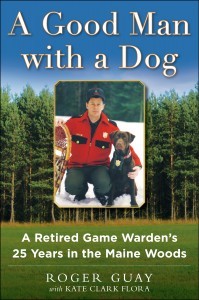 manhunt for Martin Luther King’s assassin, author Hampton Sides writes: “All writers sooner or later go back to the place where they came from.” I’ve been thinking about that as I’ve been trying to figure out what to write to celebrate the publication of my fifteenth book, A Good Man with a Dog, which is actually retired Maine game warden Roger Guay’s memoir. When I think about what to say about the book, I get stuck at the very beginning: How can I call this “my” book when it is someone else’s memoir?
manhunt for Martin Luther King’s assassin, author Hampton Sides writes: “All writers sooner or later go back to the place where they came from.” I’ve been thinking about that as I’ve been trying to figure out what to write to celebrate the publication of my fifteenth book, A Good Man with a Dog, which is actually retired Maine game warden Roger Guay’s memoir. When I think about what to say about the book, I get stuck at the very beginning: How can I call this “my” book when it is someone else’s memoir?
I’m sure by now you’re wondering what any of this has to do with Hampton Sides, and it is simply this: just as he was drawn to write about a murder in Memphis because it was where he was from, I am drawn to write about Maine. As you’re no doubt gathered from my musings on this blog, I am not naturally adventurous. I prefer to sit at a desk, immersed in words, trying to use those words to carry you, the reader, into some world that I’ve imagined, and hold you there for the length of a story. In the world of nonfiction, it is different. And it is the same. You might not find a simple recitation of the dates, names, and events in a law enforcement career very engaging. But in the hands of a storyteller, you might.
The creation of A Good Man is the result of a storyteller in the old fashion oral tradition—Roger Guay—coming to another storyteller in the writing tradition—me—and asking for help. And although I am not by nature a collaborator, and knew nothing about writing memoir (and little about writing nonfiction), the joint venture worked in part because—in the words of Hampton Sides—the world I was being invited to write in represented, in part, a return to the place I came from.
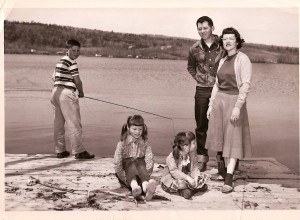 Growing up on a farm in rural Maine, hunting and fishing and the intimate relationship with wildlife, the outdoors, and the rhythm of the seasons were all fundamental parts of life. We walked in the woods and swam in ponds and streams. On summer evenings, my brother and I poled our raft out into the pond and went fishing. The fish and game birds my father brought home provided many delicious meals and if he could get a deer, it would make a huge difference in our food budget, and money was always scarce. Our holiday gifts to relatives were terrariums filled with mosses and plants from our woods, homemade cookies, balsam pillows stitched on the trusty old Singer machine and stuffed with balsam we’d gathered and snipped. We lived in an essential relationship with the land, the plants, and the creatures that inhabited it.
Growing up on a farm in rural Maine, hunting and fishing and the intimate relationship with wildlife, the outdoors, and the rhythm of the seasons were all fundamental parts of life. We walked in the woods and swam in ponds and streams. On summer evenings, my brother and I poled our raft out into the pond and went fishing. The fish and game birds my father brought home provided many delicious meals and if he could get a deer, it would make a huge difference in our food budget, and money was always scarce. Our holiday gifts to relatives were terrariums filled with mosses and plants from our woods, homemade cookies, balsam pillows stitched on the trusty old Singer machine and stuffed with balsam we’d gathered and snipped. We lived in an essential relationship with the land, the plants, and the creatures that inhabited it.
Over the years, I, like many who grew up in small towns, moved away and moved on. College in Massachusetts, then law school, and life in the suburbs. I lived far more in a world where the idea of guns as an everyday thing horrified people, and many had no idea where food came from beyond the grocery store. I would drive down the highway and notice the emerging green of trees or the fat woodchuck in the median, or the sudden swoop of a hawk, while the drivers around me were immersed in their phones. And then Roger Guay’s phone call came—he liked what Joe Loughlin and I had done in Finding Amy, he had stories to tell and didn’t know how to tell them, could I help?—and I was given a chance to revisit the world I’d grown up in, and then go deeper and learn to see it in new ways.
Stories about real people and real events are a great way to illuminate a world, and the 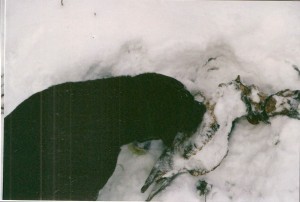 wardens’ world is a fascinating one. The book is so rich with information that it’s impossible to list all the things I learned. About poaching. About deer and moose habitat, habits, and survival. About the blind selfishness of some fishermen and the harm that selfishness and careless can do to our environment. I learned about search and rescue and about reading the minds of the lost and the clues they leave behind.
wardens’ world is a fascinating one. The book is so rich with information that it’s impossible to list all the things I learned. About poaching. About deer and moose habitat, habits, and survival. About the blind selfishness of some fishermen and the harm that selfishness and careless can do to our environment. I learned about search and rescue and about reading the minds of the lost and the clues they leave behind.
Despite writing about law enforcement for years, I never really thought much about how enforcement goes on all day and all night, in all seasons, and in all types of weather. When people need help, cops and wardens are the ones who get the calls.
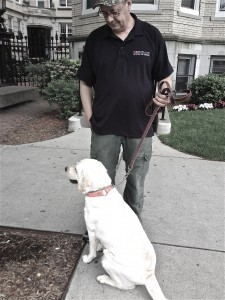 Although I grew up with dogs, I’m rather timid around them, but now that I’ve been on trainings and watched them work, and been “lost” and rescued, I see them differently. I think of all the amazing things dogs can do to be assets to law enforcement, including outdoor crime scene reconstruction and locating evidence. I wonder about their personalities and their skill sets and what they can be trained to do.
Although I grew up with dogs, I’m rather timid around them, but now that I’ve been on trainings and watched them work, and been “lost” and rescued, I see them differently. I think of all the amazing things dogs can do to be assets to law enforcement, including outdoor crime scene reconstruction and locating evidence. I wonder about their personalities and their skill sets and what they can be trained to do.
I pass a Maine warden service truck and I smile.
So if you or someone you know might be fascinated by the world of “off-road traffic cops,” if you wonder what it’s like to rescue lost skiers in Gulf Hagas in the middle of a frozen night, face down a drunken boater who is reaching for his gun, or if you’re curious about the attack of the blind owl, come see me and Roger (and perhaps Saba the yellow lab) at one of our events. And ask your bookstore or local library for a copy of the book.
And that will make me smile.
Buying links: http://amzn.to/1S2HZJ2
ISBN-13:9781510704800
@RGAuthor
@kateflora
April 10, 2016
Libraries: The cost is little, the return great
By Maureen Milliken
We live in a cost versus return world. I never took economics in school, and I know if I did I would have stunk at it. I don’t know the accurate phrase for it, but what I’m talking about, basically, is the philosophy that if you’re going to pay for something you need to see a return in something tangible. Preferably money. If not money, goods.
Many people would like to see government run like a business, with a return on the “investment” of our taxes showing in… well, I’m not sure what. Free ice cream for everyone? Bonuses when we come in under budget?
The less tangible returns, like a well-educated population or an arts culture that can enrich a community and ultimately benefit it in ways more than just economic, are dismissed and frequently forgotten. People frequently say that the private sector will pick up where public money leaves off, but the private sector seems to want its free ice cream, too.
The whole cost versus return thing was on my mind recently as I took a road trip through Franklin County, the site of the fictional town in my Bernie O’Dea mystery series. I was fulfilling a self-imposed obligation that I’d put off for way too long: delivering copies of Cold Hard News, the first in the series, to libraries.
I was donating the books, whether the libraries liked it or not. It’s something I’d vowed to do long before my book was published last June.

Webster Library in Kingfield
I grew up in libraries and without them there would be no Cold Hard News. Who knows? There may not even be Maureen the newspaper editor or Maureen the productive member of society. I think most writers can say the same.
Donating my book, I figured, was the least I could do. Really, when you think about it, the very least. Still, it’s funny the reaction I sometimes get from people who believe I should try to push the libraries to buy it instead. Some libraries, I’ve found, already have, and I’m grateful. On the other hand, I’m not going to miss that few dollars (an attitude, I’m sure, that contributes to the hatred I feel from my oil dealer and mortgage company). It’s a small return to the libraries for the what they’ve given to me.
As I visited several Franklin County libraries a couple weeks ago, I was reminded, too, what warm and welcoming places they are. How great they smell and how good it feels to be in them. How I want to sink down in a row of books and just start reading.
It’s also hard not to be reminded of how they struggle daily to offer the basics, much less the extras that they do.
I spent half an hour talking to the librarian in Phillips about their programs. I spent another twenty minutes talking to the Kingfield librarian, who’d only been in the job a short time, but had big plans and a lot of optimism about what will be happening at Webster Library.

Phillips Public Library
Then this happened in the last town I visited. The librarian looked at me with dismay when I offered my book (I’m not making that up). She didn’t want to take it. “We’d have nowhere to put it. You can see how small we are.” It was small, a very tiny, crowded room.
I assured her the book wasn’t self-published, was that the problem? Not really, but “If we took yours, we’d have to take everyone’s.”
I gave her my information sheet, complete with blurbs and all sorts of other great stuff, to reassure her it wouldn’t be a waste of shelf space. “The book has been fairly well-received,” I said.
I finally wore her down and she took it, saying maybe she could put it out on the table for people to read and see what they thought. If they liked it, it’s possible she could squeeze it in somewhere.
I walked away troubled. Not by the exchange so much (30 years in the newspaper business makes me fairly immune to people who aren’t in love with what I have to offer), but by the position the librarian was in that would force her to … reject a free book.
Let’s forget, for a second, the possible parade of horrific unreadable books that are being foisted on this tiny, remote west-central Maine library that would force a librarian to regard an author with horror when she tries to donate a book.
The issue is actually, I’m sure, that she’s fighting a constant battle of no space, probably little help and a diminishing budget with possibly little show of support from the community. And here I am barging in with a big smile and a book and it’s all too much.
So sad, not only for that library and librarian, but for that town.

Lithgow Library in Augusta
When I moved back to Maine five years ago, I wanted to live in a town that was fairly centrally located between Augusta and Waterville, the two cities I’d be working in, but that also had a vibrant community and a story open year-round I could walk to. It never occurred to me to check out the library.
I’d grown up in Augusta, a few blocks from beautiful, wonderful Lithgow, which as I write this is undergoing an $11.5 million renovation.

Belgrade Public Library
When I landed in Belgrade, I found its library, like the one I visited a couple weeks ago in Franklin County, jammed into about 250 square feet of space in the community center. Thanks to a dedicated group of volunteers and a generous donation from Hammond Lumber, the Belgrade Public Library opened in a new, bigger building a year or two later. It gets a lot of support from the community, if not always from the town government or budget.
Had I known, when I moved to town, that there wasn’t a full-time, fully supported library that was embraced by the town government, I wonder what impact it would have had on my decision to live here? I’m not sure if it would have made me look somewhere else, but it definitely would have affected my decision.
Libraries cost money. The return, though, is immense. Priceless and uncountable.
I’m not just talking about their impact on lives of weird little girls who grow up to become mystery writers, but their impact on the community as a whole. The librarians in Phillips and Kingfield talked enthusiastically about their communities and the library’s role in it. It’s hard to believe that type of involvement isn’t felt by a community in rippling, uncountable ways.
This is National Library Week. I’m urging everyone to weigh the “cost” of their town’s library against the return, and let your library know — in a tangible way — that the cost is worth it.
***
Speaking of libraries, join me, and fellow mystery writers Kathy Lynn Emerson and Janet Morgan 1-3 p.m. Thursday at Lithgow Library in Augusta (i’s temporary location at the Ballard Center, East Chestnut Street, the old Augusta General Hospital), for a Sisters in Crime Speakers Panel discussion on The Modern Heroine as well as other other mystery-related topics. We’ll have books available and be happy to sign.
Maureen Milliken is the author of Cold Hard News, the first in the Bernie O’Dea mystery series. The second, No News is Bad News, is due out this summer. Follow her on Twitter: @mmilliken47, or on Facebook at Maureen Milliken mysteries. Sign up for email updates on her website, maureenmilliken.com.
April 8, 2016
Weekend Update: April 9-10, 2016
 Next week at Maine Crime Writers there will be posts by Maureen Milliken (Monday), Kate Flora (Tuesday), Katherine Hall Page (Wednesday), a guest librarian (Thursday), and John Clark (Friday).
Next week at Maine Crime Writers there will be posts by Maureen Milliken (Monday), Kate Flora (Tuesday), Katherine Hall Page (Wednesday), a guest librarian (Thursday), and John Clark (Friday).
We are celebrating National Library Week this week. Authors love libraries, and our Maine libraries–and librarians–are a very special part of our writing lives. We hope lots of librarians will drop in this week to comment. And of course, some lucky person who comments this week will win one of these great tote bags, either Nancy Drew, A composition book, or Edgar Allan Poe.
Rumor has it the bag will be filled with Maine-made goodies. And perhaps even some books.
In the news department, here’s what’s happening with some of us who blog regularly at Maine Crime Writers:
The authors of the new book “A Good Man with a Dog: A Game Warden’s 25 Years in the Maine Woods” Roger Guay and Kate Clark Flora will be at the Pittsfield Public Library April 13th at 6:00pm.
They will be talking about the book that is a fascinating look at a game warden’s life.
When Roger Guay’s father died in a tragic fishing accident, a kind game warden helped him through the loss. Inspired by this experience, as well as his love of the outdoors, Guay became a game warden and certified K9 handler, beginning a successful career that would span twenty-five years and see him establish canine units as a staple of the game warden service. Guay takes readers into the patient, watchful world of a warden catching poachers and protecting pristine wilderness, and the sometimes CSI-like reconstruction of deer- and moose-poaching scenes. His frequent companion is a little brown lab named Reba, who can find discarded weapons, ejected shells, hidden fish, and missing people. A Good Man with a Dog explores Guay’s life as he and his canine partners are exposed to increasingly terrible events, from tracking down hostile poachers to searching for victims of violent crimes, including a year-long search for the hidden graves of two babies buried by a Massachusetts cult. Kate will also talk about the fascinating world of true crime that led her into doing research for the Joe Burgess police fiction series.
Kathy Lynn Emerson/Kaitlyn Dunnett and Maureen Milliken, along with Maine mystery writer Janet Morgan, will be presenting a panel on “The Modern Heroine” at Lithgow Library in Augusta on April 14 from 1-3 in the afternoon. If you plan to attend, don’t forget that the Lithgow is still at its temporary location at the Ballard Center.
An invitation to readers of this blog: Do you have news relating to Maine, Crime, or Writing? We’d love to hear from you. Just comment below to share.
And a reminder: If your library, school, or organization is looking for a speaker, we are often available to talk about the writing process, research, where we get our ideas, and other mysteries of the business. Contact Kate Flora: mailto: kateflora@gmail.com
Why I Write
Bruce Robert Coffin here, hoping you’re all having a terrific spring.
This month I want to discuss the why of writing. People often ask what it is about writing that I enjoy. Why do I do it? Hmm. How much time do you have?
There are no easy answers to that question. The truth is, my answer might vary on any given day. Some days I write simply to quiet the voice in my head. You know the one. The voice that needs to be heard, usually around two or three in the AM when we’re suppose to be able to unplug and give that old gray matter a bit of rest. In my case, as I suspect is also the case with other writers, there is usually more than one voice.

Those Pesky Voices
Once created, our characters can be as annoying real as anyone in the physical world. And they speak, often demanding to be heard. I may have ideas in store for my characters with which they disagree, or perhaps they agree but have their own thoughts on how to take those ideas further, or in other directions. Writing quiets the voices. Usually. This may sound crazy to some, but it’s true. Don’t believe it? Next time you bump into your favorite author ask them, preferably during a one on one conversation not while standing in line at a book signing. You don’t want to be dragged out of the event kicking and screaming by the nice folks in the long white lab coats.
“Excuse me. We’d like you to come with us. We have some nice stuffed animals for you to play with.”
Also, suggesting that I told you to ask won’t save you either. It may only serve to get both of us assigned to the same padded room at the farm.
There are other reasons I write. Sometimes it’s just cool to hang out in the imaginary worlds I’ve created. It’s what we writers of fiction do. Probably not a whole lot different than a child playing make believe. Exploring one’s imagination for the purpose of writing is very much like that, only with a more sophisticated and developed sense of prose. Usually. Jumping into the car with my protagonist, Sergeant Byron, as he races to catch a bad guy is still thrilling for me. I don’t always know how things will play out and that’s the fun of it. I can’t wait to find out which of my characters is about to beam down to the planet as a part of the landing party, wearing a red shirt, never to be seen again. Those of you who didn’t get that reference need to report directly to the principal’s office. Principal Roddenberry wants to see you. You’re about to be fitted for a red shirt. To the rest of you, live long, write well, and prosper.
I write to find out which of my characters is about to do something dumb? Isn’t that one of the great turning points for any plot? Or even life for that matter? While we may have composed a detailed synopsis for our novel to follow, seldom does it. Like real life, courses are often deviated from. Plans change. Remember that awesome quote about life being what happens while your busy making other plans? Sometimes a great story happens while we’re busy writing a different one. The unknown is the very thing that makes writing enjoyable. Writing a story is much like reading one, only a hell of a lot more work (and please remember that when your writing a scathing review, after spending eight hours reading a book that likely took a year, or two, or three to write). If we as writers already knew how every little thing turns out in our novel, it wouldn’t be half as much fun to write, now would it?
Sometimes I write because I have something to say. I think that’s basically true for almost everything I write. Occasionally, the meaning may be hidden amid an exciting, or scary, or somber storyline, but it’s almost always there. Were there no message, what would be the point?
I write to share experiences, both good and bad. It might be my attempt to impart a bit of wisdom, and believe me if it’s more than just a bit you should ask for your money back. Maybe I’m hoping to share lesson about life, or try and bring reason and perspective to some volatile topic of the day. Or maybe I only wish to share literary images from one of my playful romps through the Maine woods.
Mostly I write because I love it. I write to entertain. I love sharing ideas with others, evoking emotion through words and phrases. I love the telling of the stories. I write because I must.
Are you a writer? What motivates you?
April 6, 2016
SWAMP & STREAM
Susan Vaughan here. I know, my title’s a bad takeoff on Field & Stream. My post today is a nature travelogue of my recent week in southwest Florida. With my husband and other family members, I visited two nature conservancy centers that were reminders both of human’s adverse effects on the environment and of the human efforts to save it. Attacks on the environment, whether purposeful or inadvertent, happen everywhere, but these tours also nudged me to compare Maine and Florida.
In Maine, we’re concerned about our old growth forests. In Florida, cypress trees are endangered. The Corkscrew Swamp Sanctuary in Naples was established to protect the largest remaining stand of bald cypress left in North America.
When acquired in 1954, in cooperation with the Audubon Society, the swamp was isolated and almost impossible to access. Today the sanctuary preserves native plants, native animals, and the cypress. We walked the boardwalk that winds its way through and around the swamp. Bald cypress once dominated the deep swamps of Florida and the Southeastern U.S. They lose their needles during the winter, hence the name “bald.” Scientists used to think that cypress “knees,” the knobby growth in the water, both stabilizes and feeds the parent tree, but they have since learned the knees are only for stabilization.
Some of the cypress are hundreds of years old. I have to rely on memory, but I believe the oldest is the Muir Tree, over 500 years old and too large for a photo to do justice. There are twelve species of air plants in the swamp. Related to the pineapple, they’re not parasites, but take their nutrients from the rainfall and falling organic debris.
Water fern floats and can cover large expanses of the water’s surface. Blue flag irises are found in Maine, and we found many in the sunnier parts of the swamp. Some creatures there also live in Maine, a pileated woodpecker and a raccoon. Not so the snowy egret happily munching greens as we passed by. We were told that people occasionally spot alligators and Florida panthers.
Florida panthers are tawny like cougars, but smaller. No panther for us, but the next day, a woman from Wisconsin videoed a panther running along the boardwalk. I’d have been so shocked, I couldn’t have held the camera, but she didn’t even shake the camera. You can see the news coverage here. Instead, here’s the alligator we saw.
Our other nature tour was to the Conservancy of Southwest Florida Nature Center, also in Naples. Their motto could apply to Maine as well: “Our Water, Land, Wildlife, Future.” Their work and fundraising protects and educates about all of those areas. We toured the nature center and then boarded their electric tour boat for a ride through the lagoon and on the small Gordon River.
In this location, the endangered trees were mangroves. Our guide wasn’t as specific as the NOAA website, which tells me that mangrove trees grow in tropical and sub-tropical areas with low-oxygen soil, where slow-moving waters allow fine sediments to accumulate.
Their dense “prop” roots make the trees appear to be standing on stilts above the water. This tangle allows the trees to handle the daily rise and fall of tides. They stabilize shorelines, whether on the coast or here on this river, maintain water quality and clarity, and filter pollutants and sediments.
Mangroves are homes to shrimp, crustaceans, mollusks, and fish. They also support nesting birds and larger animals like alligators and turtles. Along the river, our guide pointed out a pair of nesting yellow-crowned night herons, but the boat passed too quickly for me to snap their picture. You’ll have to look it up in your birding book.
And big doings coming next week. April 10-16, National Library Week, the Maine Crime Writers are planning some special fun. And at the end of the month, one lucky commenter will win a gift basket with Maine treats and Maine reads.
April 5, 2016
English Translation of English
Dorothy Cannell: I was talking with a friend (aka husband) recently and we agreed that the words he or she ‘meant well’ have to be amongst the most damning in the English language. Conclusion: Outcome may range between disappointing and disastrous, but is never good.
Example: John is a romantic; he meant well. Possible response:
‘Yes, I don’t doubt John thought he was being a pal inviting Mary Smith and her ex-husband to the dinner party in hope of bringing about a reconciliation, but we’re still looking at a body with a steak knife sticking out of its back.”
And while on the subject of red flag-waving assertions, my friend and I considered the phrase: “To be completely frank with you …”
Why the need to assert honesty with adverb to boot? Could suggest to the suspicious that this hasn’t always been the case or even (to a nasty-minded person) that the speaker is fibbing now.
This vein of thought reminded me that one of the things likely to make dialogue come alive for me on the page is the suggestion that a character’s words can’t be taken at face value, thereby allowing for probing of his or her personality and that of others participating in the conversation. Denials are often promising.
Example: A Woman invited to have another piece of cake. 
“I really mustn’t be greedy!”
Possible interpretation: She’s dying for a really big slice.
Possible kindly response from other character: “Are you sure? It would be a pity to let it go stale.”
Or, nastily: “Very sensible. We can all do with losing a little weight if we are to make any attempt at looking our best.”
The more vehement the denial the more grist for the poking.
Example: Person asked about his (her) reaction to coming into a large inheritance.
“It’d never crossed my mind, not once in twenty years of doing Uncle Henry’s shopping and cooking his dinner three or four times a week, that he’d leave me his house and all that money. You could’ve knocked me down with a feather when the solicitor read out the will.”
Possible interpretation: Had been counting down the minutes until the old boy kicked the bucket.
Possible kindly response: “I’m sure it didn’t. No one could ever think you grasping.”
Or nastily: “Pull the other leg. It’s got bells on.”
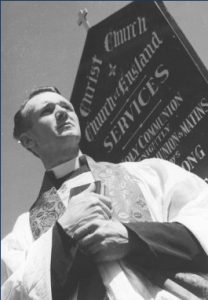 Here’s another potential denial gem: Woman asked she thinks of the vicar’s recently announced engagement to the visiting nurse.
Here’s another potential denial gem: Woman asked she thinks of the vicar’s recently announced engagement to the visiting nurse.
“I have absolutely nothing to say on the matter!”
Possible interpretation: Bursting at the seams to have her say into the middle of the next week.
Kindly response: “I shouldn’t have brought up the matter, not with you being his housekeeper.”
Or nastily: “Really? Who could blame you for feeling murderous after years of slavishly going above and aboard the job description? Oh, yes! Poor fool, you! What a shame you’re not a rich blonde with a bishop for an uncle!”
It’s wonderful when one small remark kicks the dialogue forward and in doing so propels the plot – possibly in a previously unforeseen direction. Which reminds me, I should get back to book in progress. But in ending I would like to add one final thought: To be absolutely frank I have never had the smallest desire to be Number One on the New York Times best seller list, win a Pulitzer or get a three million dollar advance.
Best wishes,
Dorothy
April 4, 2016
Between Revisions
 There are a few writers out there who can dash off a manuscript and get it right the first time. They self-edit in their heads before they put fingers to keyboard. For most of us, however, producing a short story or a novel requires writing several drafts, and that’s before an editor lays eyes on it. The earliest one is usually called the first draft, but it also goes by other names, among them rough draft, shit draft, and no-one-sees-this-but-me draft. The process that leads to a final draft is called revising or rewriting. Between drafts, I like to let my manuscript “rest” for as long as possible, so that I can come back to it with fresh eyes and fresh ideas. That’s where I am now. I’ve done the first “read thru/revision” of the “rough draft” and it (and I) are taking a break.
There are a few writers out there who can dash off a manuscript and get it right the first time. They self-edit in their heads before they put fingers to keyboard. For most of us, however, producing a short story or a novel requires writing several drafts, and that’s before an editor lays eyes on it. The earliest one is usually called the first draft, but it also goes by other names, among them rough draft, shit draft, and no-one-sees-this-but-me draft. The process that leads to a final draft is called revising or rewriting. Between drafts, I like to let my manuscript “rest” for as long as possible, so that I can come back to it with fresh eyes and fresh ideas. That’s where I am now. I’ve done the first “read thru/revision” of the “rough draft” and it (and I) are taking a break.
Sort of.
The project (the third Mistress Jaffrey Mystery) may be on a back burner, but it’s still cooking. To be more specific, all sorts of “little things” cropped up during the first revision. Before I start the next one, I needed to do more research on some specific issues and check my facts on others,
 To help me with this process, I have two people reading all or part of what I’ve already written. My husband, who is also my trusted beta reader, gets the entire book, which he will read on his iPad. He’ll give me “notes” after he’s done, particularly on continuity and whether or not what I’ve written makes sense. I also sent about thirty pages, all the material having to do with ships and seafaring, to James L. Nelson, nautical expert extraordinaire. He knows sixteenth-century ships, having sailed as a member of the crew on the replica of the Golden Hinde, and he also knows a lot about pirates. My knowledge of these things comes entirely from books, so he has helped me catch some bloopers. Luckily, fixing them didn’t require too much rewriting. The ship pictured here, by the way, is not the Golden Hinde, but rather the replica of the Mathew, which is closer in size to the ship in my novel.
To help me with this process, I have two people reading all or part of what I’ve already written. My husband, who is also my trusted beta reader, gets the entire book, which he will read on his iPad. He’ll give me “notes” after he’s done, particularly on continuity and whether or not what I’ve written makes sense. I also sent about thirty pages, all the material having to do with ships and seafaring, to James L. Nelson, nautical expert extraordinaire. He knows sixteenth-century ships, having sailed as a member of the crew on the replica of the Golden Hinde, and he also knows a lot about pirates. My knowledge of these things comes entirely from books, so he has helped me catch some bloopers. Luckily, fixing them didn’t require too much rewriting. The ship pictured here, by the way, is not the Golden Hinde, but rather the replica of the Mathew, which is closer in size to the ship in my novel.
On my own, I needed to check three things by doing a keyword search and charting when they turn up. One was the word invasion, since the nebulous threat of an invasion plays a key role in spy subplot that goes along with the murder mystery. The other two were the names of suspects. For each of them I needed to make a timeline to make sure I didn’t accidentally say they were somewhere they can’t be. Both need to remain on Rosamond’s list of suspects for as long as possible. That was pretty easy to do, and turned up no surprises, only a couple of places where I needed to clarify how long one of those suspects was out of sight.
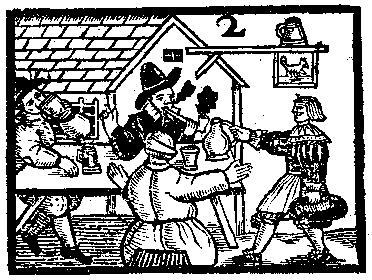 I also had to do some new research. This book is set in Cornwall. I knew that going in, and I did some research on the Cornish language before I started writing. The thing is, there’s also a Cornish dialect of English. In the draft, most of my characters sounded pretty much the same, but some are from London and the home counties, some are natives of Cornwall, and a couple hail originally from Westmorland. They wouldn’t all talk the same way today, let alone in the sixteenth century.
I also had to do some new research. This book is set in Cornwall. I knew that going in, and I did some research on the Cornish language before I started writing. The thing is, there’s also a Cornish dialect of English. In the draft, most of my characters sounded pretty much the same, but some are from London and the home counties, some are natives of Cornwall, and a couple hail originally from Westmorland. They wouldn’t all talk the same way today, let alone in the sixteenth century.
Language is always a dilemma in historical novels, and not only because writers try to avoid glaring anachronisms and obvious Americanisms. If I wrote dialogue the way Elizabethans actually spoke, their conversations would come across as bad imitation Shakespeare. A little of that goes a long way. So, you ask, if my major characters aren’t speaking exactly as they would in 1584, why do my Cornish characters need to sound authentic? A little goes a long way there, too, but I have to be sure I use the right little bits. That meant dipping into linguistics books, particularly Peter Trudgill’s The Dialects of England. Where Londoners used “you.” Cornish English speakers still said “thee.” They also said things like “I wished a good day to she,” and “Us be goin’,” “It do seem to I,” and “I be” instead of “I am.” Add a few words unique to Cornwall, like “smitch” for the dirty smoke from a fire, and I can capture the flavor of the language. The trick was to reconfigure the dialogue I need into those speech patterns. Not easy! At the moment, I’m compromising in places by having Rosamond “translate” what she hears.
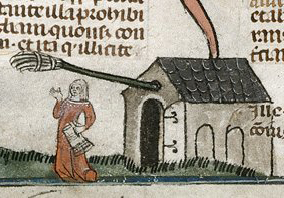
the alewife in front of her alehouse
There were also some relatively minor changes and additions I needed to make as a result of having increased my general knowledge of the way things were done in Elizabethan times. From reading Ruth Goodman’s wonderful How to be a Tudor, I gained a better understanding of how an eight-year-old boy in a gentry household would be expected to behave and have fleshed out his character. I also have a new perspective on the taste and texture of some of the food my characters eat. I’ll probably add a few more descriptive details at mealtimes on the next pass, but I have to be careful not to add too much. Nobody likes an information dump. The biggest change will be to the scenes that take place in an alehouse. Even before I read Goodman’s comments on alehouses, I had realized that mine was simply too large an establishment for the time and place. I’ve now gone through all those scenes to make them more accurate.
 I’m still in a quandary about one thing. Rosamond Jaffrey is something of a rebel, so I can get away with defying convention, but when I do I have to be sure I can make her actions believable for 1584. She’s already disguised herself as a boy in earlier books. I know of instances when real women did so, despite the fact that it was illegal. What I didn’t realize until I read Goodman’s book was that cross-dressing was specifically forbidden by St. Paul. In this book, I really want to leave the windows open and the bed curtains pulled back overnight, but most Tudor people believed that the night air carried infection and shut everything up tight when it got dark. At the moment, the window is still open. I don’t know how else Rosamond can hear something outside the house in the middle of the night.
I’m still in a quandary about one thing. Rosamond Jaffrey is something of a rebel, so I can get away with defying convention, but when I do I have to be sure I can make her actions believable for 1584. She’s already disguised herself as a boy in earlier books. I know of instances when real women did so, despite the fact that it was illegal. What I didn’t realize until I read Goodman’s book was that cross-dressing was specifically forbidden by St. Paul. In this book, I really want to leave the windows open and the bed curtains pulled back overnight, but most Tudor people believed that the night air carried infection and shut everything up tight when it got dark. At the moment, the window is still open. I don’t know how else Rosamond can hear something outside the house in the middle of the night.
All these questions will be answered, as they used to say at the end of soap operas, in the next installment. Make that revision. In the meantime, minor corrections having been made, the manuscript really is resting. When I start the second read thru/revision, I’ll be looking for places to add descriptive details but I’ll also be looking for unnecessary words, descriptions, and even whole scenes that should be cut. I’ll do that revision and at least one more. The final pass will be a read thru aimed at fixing typos, adding missing words, and eliminating any remaining unnecessary or repetitious words. What I submit will be as “clean” as I can make it, if only because it’s just plain embarrassing to have an editor catch stupid mistakes.
It’s even worse when they slip past everyone involved in the editorial process and readers spot them.
Kathy Lynn Emerson/Kaitlyn Dunnett is the author of over fifty books written under several names. She won the Agatha Award in 2008 for best mystery nonfiction for How to Write Killer Historical Mysteries and was an Agatha Award finalist in 2014 in the best mystery short story category for “The Blessing Witch.” Currently she writes the contemporary Liss MacCrimmon Mysteries (The Scottie Barked at Midnight) as Kaitlyn and the historical Mistress Jaffrey Mysteries (Murder in the Merchant’s Hall) as Kathy. The latter series is a spin-off from her earlier “Face Down” series and is set in Elizabethan England. Her websites are www.KaitlynDunnett.com and www.KathyLynnEmerson.com
Lea Wait's Blog
- Lea Wait's profile
- 509 followers















